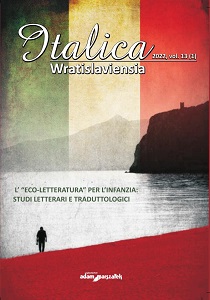"Wasted world" o "sporco mondo": tradurre i testi divulgativi per ragazzi sull’ambiente
"Wasted World" or "Sporco Mondo": Translating Informational Books for Children on Environmental Issues
Author(s): Annalisa SezziSubject(s): Environmental interactions, Translation Studies, Theory of Literature, British Literature, Italian literature, Sociology of Literature
Published by: Wydawnictwo Adam Marszałek
Keywords: ecology; translation; informational books; popularisation for children; edutainment;
Summary/Abstract: The paper focuses on the Italian translations of two English informational books for children: Wasted World (2009) and Kids Fight Climate Change (2020), which deal with environmental issues. Informational books texts result from a complex dissemination process aimed at making specialised knowledge comprehensible to young readers. To achieve this purpose, informational books rely on various discursive popularising strategies, such as an array of explanations, and various methods for eliciting readers’ engagement, such as questions and irony. Indeed, they are part of what has come to be known as “edutainment,” in which education and entertainment are intertwined to create a “hybrid genre” (Buckingham and Scanlon, 2005). As the texts examined in the paper engage with ecology and environmental issues, they have a dual purpose: to inform and to raise awareness (ecoliteracy). Despite the importance of popularising texts, the translation of such products is still an underexplored field of research. The comparative analysis of the two English texts and their respective Italian translations centres on how global warming and climate change are described in the source and target texts. It examines how the popularising strategies are translated, given their importance in knowledge dissemination for children. The findings indicate that Italian translations, though retaining the combination of education and entertainment, tend to be more precise and more complex than the source texts. This is in line with the intercultural differences identified between Low Context (LC) cultures and High Context (HC) cultures.
Journal: Italica Wratislaviensia
- Issue Year: 13/2022
- Issue No: 1
- Page Range: 165-192
- Page Count: 28
- Language: Italian

